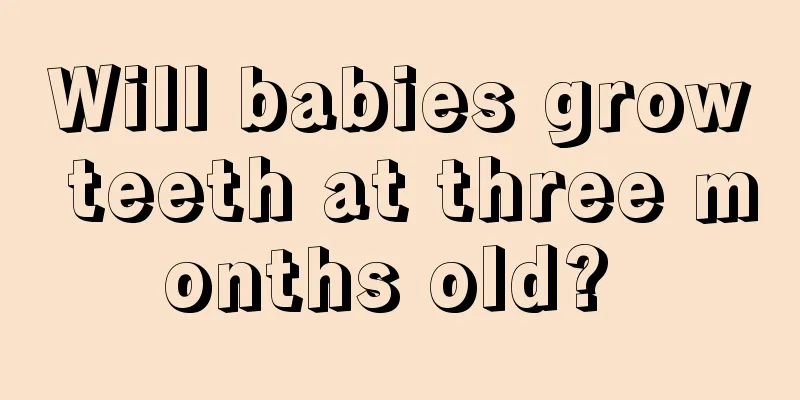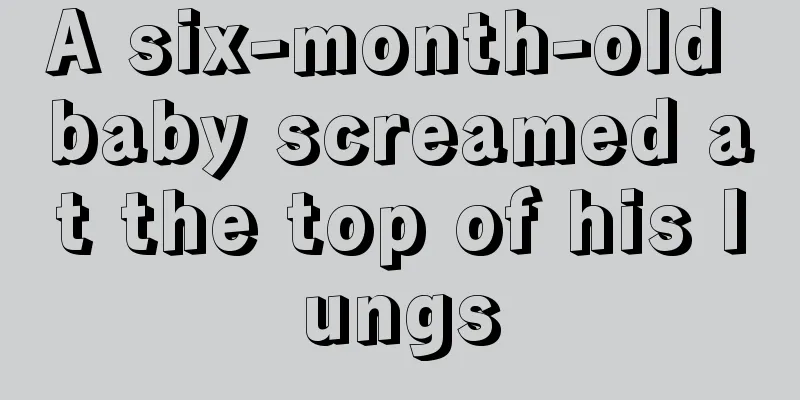Will babies grow teeth at three months old?

|
When the baby is growing teeth, as long as parents observe carefully, they will find that the baby has many behaviors. For example, some babies will have gum pain when growing teeth, or feel discomfort in the gums. The baby may cry because of this. The baby will become irritable when growing teeth. In addition, the baby will drool frequently, etc. These are all normal phenomena. So, will a three-month-old baby grow teeth? Will babies grow teeth at three months old? Is it normal for a three-month-old baby to grow teeth? Some babies start to grow teeth when they are over three months old; some babies don’t start to grow teeth until they are 10 months old; some babies cry when they are teething, and some babies have fever during the teething period... So when does a baby normally grow teeth, how many teeth does he or she grow, and what discomforts will he or she experience during teething? How should new parents take good care of their baby’s teeth during the teething period? There are several situations in which babies who have not yet reached the teething period grow teeth: One is that it is indeed the tooth tissue, which is caused by the rapid and premature development of the tooth germ. This kind of early eruption tooth is generally not well developed and complete, and the tooth root may not be fully developed before it erupts. It may cause the tooth to loosen and fall off easily in the future. This needs to be paid attention to in infancy, because children will lick it. If it falls off and falls into the respiratory tract, it may cause suffocation. You must pay attention to it. It is best to go to the hospital and let the doctor decide whether it is necessary to preserve it or prevent it from erupting. If it is very loose in the future, it should be extracted in advance, and then some space maintainers should be worn to ensure the eruption of permanent teeth and the normal development of the dentition. There is another situation, which is the epithelial remnants during the development of the tooth germ. This epithelial remnant will keratinize and harden, and appear as white spots on the surface of the oral cavity, very much like the baby's deciduous teeth that are about to grow out. However, this type of tooth will fall off by itself in the future and has little impact. 2. How many months does a baby usually start teething? When a child is born, there are no teeth in the mouth. About 6 months after birth, the mandibular central incisor begins to erupt, and all the deciduous teeth will not erupt until the age of 2 and a half. The enamel of all deciduous teeth is mineralized within 1 year after birth (1.5 months to 11 months), and all deciduous teeth erupt within 2 years after birth (6 months to 24 months). Therefore, if a child develops systemic or local disorders within one year after birth, it will affect the development of deciduous tooth enamel, leading to tooth development defects and susceptibility to caries. People have two sets of teeth in their lifetime, namely deciduous teeth and permanent teeth. Generally, babies begin to erupt deciduous teeth at 6-8 months old, grow 8-10 teeth at 1 year old, and all teeth come out at around 2 years old, for a total of 20 teeth. The first deciduous teeth to erupt are the two lower front teeth, called the deciduous central incisors, followed by the two upper front teeth, followed by the lateral incisors, deciduous molars, deciduous canines, and finally the second deciduous molars. Generally, teeth erupt in pairs at a certain time and order. When children are 6 to 8 years old, their deciduous teeth fall out one by one and are replaced by permanent teeth. The enamel of deciduous teeth is thinner and the dentin is more brittle, making them more susceptible to caries. Therefore, to maintain strong deciduous teeth, children must be provided with proper nutrition. Starting from infancy, attention should be paid to early prevention and treatment of various chronic wasting diseases and the supply of various necessary nutrients, especially vitamin D, calcium and phosphorus which are related to bone development. This is very important. Attention should be paid to children's oral hygiene, and children should be trained to brush their teeth in the morning and evening, not eat snacks before going to bed, and undergo regular oral examinations. There is great individual variability in the timing of tooth eruption. This is very important because of individual differences. Some children's teeth erupt early, while others erupt late, but as long as it is within the range of individual differences, it is normal. |
<<: Can a three-month-old baby be taught to urinate?
>>: Is it okay for a three month old baby to swim?
Recommend
How to kill Paragonimiasis
Lung fluke is a foreign species that exists in th...
What is peripartum cardiomyopathy
Many people have not heard of this disease. In fa...
How much does chemotherapy for colon cancer cost
Colon cancer has always been a disease that peopl...
Are cold hands and feet in liver cancer a sign of death?
Cold hands and feet in patients with liver cancer...
Couples doing this before going to bed is better than taking any medicine
Women's easy way to lose weight every night I...
The difference between fake eggs and eggs, teach you how to distinguish
Eggs are a common food in daily life. With the de...
Can filiform warts cause cervical cancer?
Filiform warts have a certain probability of caus...
Why do I feel like vomiting after running
It is said that exercise is good for health, but ...
How to clean printer ink from clothes
Friends who work in offices know that printers ar...
My left ankle hurts for no reason
Unexplained pain in the left ankle may not be a t...
How should we take good care of gallbladder cancer
The care of gallbladder cancer is very important....
What are the adverse reactions after hemisection of thyroid cancer
Thyroid cancer hemisection refers to total thyroi...
Recovery after tethered cord surgery
Tethered cord is a relatively common spinal disea...
What is the reaction to chemotherapy for uterine cancer
We all know that chemotherapy is the general trea...
What should I do if I always doze off at work?
In the hot summer, we always feel sleepy and cann...









